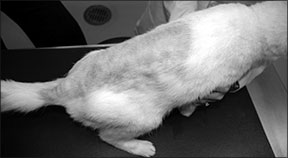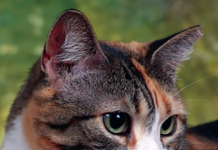All cats shed, but some cases become extreme to the point of baldness. If you’ve ever wondered if your cat needs a toupee, you’re not alone. Hair loss, or alopecia, is common in cats. It is, however, a symptom of an underlying disorder, rather than a disorder itself, says dermatologist William H. Miller, VMD, Medical Director of the Cornell University Companion Animal Hospital. “In order to solve the alopecia, we need to determine the cause of the problem,” Dr. Miller says.

288
Among the types of hair loss and their causes:
Failure to regrow. “It’s usually due to an underlying endocrine condition,” Dr. Miller says. Causes can include diabetes mellitus, hyperthyroidism, which is an overproduction of thyroid hormone, and Cushing’s syndrome (hyperadrenocorticism), an overproduction of cortisol by the adrenal gland.
Hair falling out. “This is often due to stress — for example, the delivery of kittens or a serious illness,” Dr. Miller says. Some cancers, such as those of the pancreas, have been linked to hair loss. The ringworm fungus and parasitic mites, which cause mange, can also be culprits, as can poor diet, sometimes from poorly formulated cat food with low nutritional value.
Hair being licked off or pulled out when a cat engages in excessive grooming to dispel anxiety. Breeds most affected include the Siamese, Burmese, Himalayan and Abyssinian. Over-grooming can lead to small reddish bald spots that will spread and become irritated or infected as the cat continues to scratch or chew at them. Veterinary behaviorists now recognize the behavior as obsessive-compulsive and sometimes prescribe anti-anxiety medications.
In almost all cases of traumatic hair loss, though, “The trigger event is underlying allergy, typically to a parasite or an environmental or food allergen,” says Dr. Miller. Just as humans do, some cats can have allergic reactions to pollen, dust, mold, rubber, plastic, dyes or chemicals in carpets, bedding and cleaning products.
One particularly common allergen is flea saliva. In allergic cats, flea bites can cause intense itchiness, which may prompt them to repeatedly lick and chew at their haircoat. Cats may react similarly to certain topical medications or injections.
“While allergies can affect any breed of cat, some purebred lines have an increased frequency of allergy,” Dr. Miller says. “The breeds affected can vary depending on the region of the country, but the Siamese and Persian breeds tend to be over represented.”
For cats with an illness or allergy, the coat tells the tale. “Pay attention to your cat’s coat and behavior,” Dr. Miller says. “If the coat starts to get dull and dry, or develops hairless patches, take the cat to the veterinarian early on.”
You may notice your cat licking excessively or chewing at his fur. Or you may find clumps of hair in his favorite resting spots. A sudden increase in hairballs and constipation often follow excessive grooming, so be alert for these symptoms as well.
Diagnosing hair loss is easy, Dr. Miller says. “The coat is thinner than normal or may be totally gone. The tricky part is determining the cause. The history and location of the hair loss may help the veterinarian decide which diseases need to be considered.”
Diagnostic Tests. Blood tests may uncover underlying diseases. X-rays may help detect adrenal gland abnormalities. If your cat’s veterinarian suspects a dermatological problem, skin samples may be taken to check for mites or a fungal culture to check for ringworm.
Treatment depends on the cause of the hair loss, says Dr. Miller. “Parasitic diseases are treated with anti-parasitic agents. Endocrine hair loss needs to have the underlying endocrine disease treated.” Flea preventives are available for flea allergies, and veterinarian-prescribed antihistamines or steroids can treat the inflammation.
A food allergy may require an overhaul of your cat’s diet. His veterinarian may recommend a food elimination trial to determine the offending allergen.
It may not be easy to determine the reason your cat’s hair is falling out, but once you do, proper treatment will allow the hair to regrow normally and your favorite feline will return to their full-coated glory. ❖



